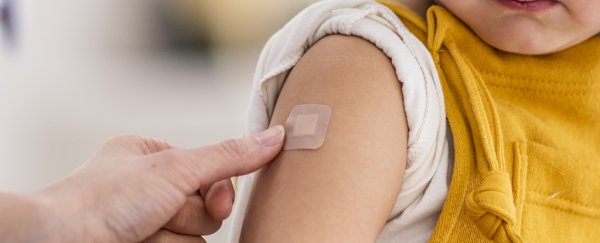We know that online social networks are having a dramatic impact on the way we gather and absorb information, and it's always worth checking out who is behind the links and adverts you see in your feed – because it can be very enlightening.
Case in point: vaccines. You might feel like there's a mobilising army of opposition to vaccines on the web, but the reality has turned out to be quite different, according to a new study. Digging into the sources behind antivax advertising, a team of US researchers has discovered that 54 percent of antivax ads up to February 2019 were paid for by just two organisations.
Those organisations are the World Mercury Project run by Robert Kennedy Jr, and the Stop Mandatory Vaccinations campaign run by Larry Cook, both peddling anti-vaccination claims that have been debunked time and time again by scientists.
The researchers looked into Facebook's public Ad Library for their data, an initiative to try and improve ad transparency on the social network. As of March this year, antivax ads have been banned on the platform as being political, although pro-vaccine ads seem to be getting caught up in the same net.
"The average person might think that this anti-vaccine movement is a grassroots effort led by parents, but what we see on Facebook is that there are a handful of well-connected, powerful people who are responsible for the majority of advertisements," says anthropologist Amelia Jamison, from the University of Maryland.
The study analysed 309 Facebook adverts displayed collected in December 2018 and February 2019: 163 had a pro-vaccine message, and 145 were anti-vaccine. Facebook's detailed targeting tools can be used to point antivax ads towards people in areas where their claims are more readily believed, or towards mothers with young children.
According to the new research, the anti-vaccine ads had more money behind them and a slightly bigger reach than the pro-vaccine ads. For anyone interested in the health and well-being of the general public, that's a problem.
A total of 27 unique buyers were behind the 145 anti-vaccine ads, the research found, while 83 unique buyers were behind the 163 pro-vaccine advertisements.
The Minnesota Hospitals Association is one of the organisations that has seen pro-vaccine ads blocked by Facebook, showing how adverts from both sides have been caught up in the same net.
"From our organisational perspective, vaccine misinformation causes real harm to individuals and their communities," Emily Lowther, a spokesperson for the Minnesota Hospitals Association, who wasn't involved in the study, told the The Guardian.
Other platforms, including GoFundMe and YouTube, have also been taking a stand against the misinformation spread by Kennedy Jr, Cook and others, but one of the concerns that's been raised is that antivax groups are better at gaming the system than pro-science advertisers.
In other words, antivax ads can be constructed in such a way as to comply with the rules set down by networks including Facebook, while still promoting views and claims that have no scientific credibility behind them.
The researchers behind the new study are calling on Facebook and similar platforms to take greater steps to combat "vaccine hesitancy" – now named as one of the top 10 global threats to public health by the World Health Organisation (WHO).
"While everyone knows that Facebook can be used to spread misinformation, few people realise the control that advertisers have to target their message," says computer scientist Mark Dredze, from Johns Hopkins University.
"For a few thousand dollars, a small number of anti-vaccine groups can micro-target their message, exploiting vulnerabilities in the health of the public."
The research has been published in Vaccine.
